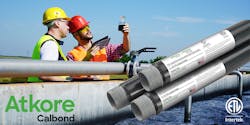Wastewater treatment plants (WWTP) process and handle some of the most corrosive solids and liquids throughout process engineering. After prolonged operation, this can often cause damage to electrical conduit systems. A wastewater treatment plant contains just about the greatest possible potential for damage caused by microbiologically influenced corrosion (MIC). Odor control systems do not completely solve the corrosion problem in WWTP, for odor control systems themselves are not free of damaging exposures.
Hydrogen sulfide, methane, ammonia, oxygen, carbon dioxide, and nitrogen are found dissolved in wastewater, with anaerobic decomposition of such gases producing other odorous compounds, amines, and fatty acids that lead to unforeseen corrosion threats.
The interaction of primary components of sewage producing secondary chemicals can create even more toxic or corrosive properties in existing wastewater, leading to faster, and more destructive, system failures in a plant.
Corrosion rates of carbon steel and iron in wastewater can be accelerated 5 to 10 times by local acidic conditions produced by the microbiological action. PVC and polyurethane corrosion resistant coatings will not provide the intended protection without proper preparation of the conduit galvanized zinc surfaces. Wastewater treatment plants making use of extensive fabrication in PVC-coated aluminum offer a solution to the infrastructure corrosion problem.
Atkore’s Calbond ETL-Verified and UL 6 Listed PVC Coated conduit systems are proven anti-corrosive solutions for wastewater treatment plants. It is important to note the UL 6 zinc coating requirement when discussing the ETL verification. ETL is a 3rd party verification test that examines the adhesion strength of PVC coating to rigid steel conduit substrate. The zinc protective coating requirement found in UL 6 makes the bonding of PVC coatings more challenging. PVC coating does not inherently bond to zinc. As a result, a special bonding agent was developed by Atkore Calbond to ensure a secure PVC coating bond that exceeds the requirements of the ETL test.
In addition to extending the life of metal conduit systems, PVC coated conduit reduces the number of costly shutdowns and repairs in wastewater treatment plants while protecting your most critical electrical circuits in harsh and corrosive environments.
Editor's Note: Scranton Gillette Communications and the SGC Infrastructure Group are not liable for the accuracy, efficacy and validity of the claims made in this piece. The views expressed in this content do not reflect the position of the Roads & Bridges' Editorial Team.
